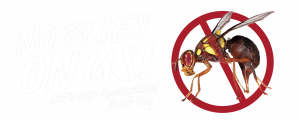Lions Clubs across the Goulburn Murray Valley (GMV) will take on the role of fruit fly ambassadors through the delivery of a community awareness and education campaign.
The Lions Regional Conference was held from 27 October – 29 October 2017 at Barham-Koondrook, with members voting to adopt the ‘Queensland Fruit Fly Community Awareness and Education Campaign’ as a Regional Lions’ Project throughout the GMV and surrounding areas.
Goulburn Murray Valley Regional Fruit Fly Coordinator Ross Abberfield attended the conference and received enthusiastic support from Lions Club members. “By voting to adopt the campaign, Lions members recognised that broad community support is required to maintain and grow the strength of the GMV’s horticultural sector.” he said.
“In order to protect our multi-million dollar horticultural industry, it is essential we work with the community to control the spread of Queensland Fruit Fly (QFF) and raise awareness about fruit fly management.”
“We welcome the opportunity to continue to work with Lions Clubs across the region in order to ensure the community is aware of the risk QFF pose and is familiar with key actions home gardeners can take to reduce this threat,” Mr Abberfield said. The Goulburn Murray Valley Regional Fruit Fly Action Group supported the ‘Bye Bye Fruit Fly’ pilot program which saw the Tongala Lions Club deliver a primary schools and community awareness and education day rnon 17 October 2017.
As part of the pilot program, Tongala Lions Club made almost 400 home made fruit fly traps, which were decorated by over 250 school children and distributed throughout the Tongala community.
At the completion of the activity session, students took their fruit fly traps home and distributed them amongst family and friends. Students were encouraged to monitor the number of QFF caught in the traps.
“In instances where QFFs were caught, the trap owners could then undertake protection and reduction measures,” Mr Abberfield said.
“By involving school children, parents, friends, community service clubs and the general community we are building community awareness about how to easily and effectively suppress QFF numbers through integrated management practices,” he said. A community education session formed part of the pilot program and QFF information brochures were distributed to every household in Tongala.
“The fact that the Lions have now adopted this program at a regional level means that we can roll out similar QFF education and management programs across the region and develop a true community response to the control of fruit fly,” Mr Abberfield said.
“A focus on community engagement, together with official trapping, mapping and research will have a major impact on reducing the spread of QFF,” he said. Other components of an area wide management strategy include the free Urban Fruit Tree Removal Program, which has been extended until the end of November; removal of rogue host fruit trees on public lands; abandoned orchards control; and a broad communications program.
“A range of activities and management actions are necessary to support the eventual deployment of sterilized QFF into the wild population of QFF to suppress the spread of this pest,” Mr Abberfield said.
For more information about QFF go to www.gmv-qldfruitfly.com.au or like the Murray Valley Regional Fruit Fly Action Group Facebook page.
